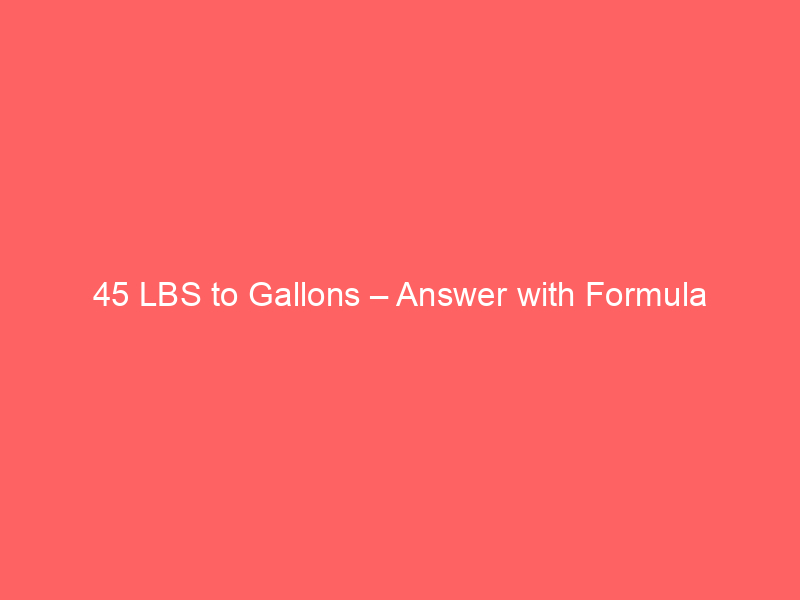45 lbs is approximately 5.347 gallons. To convert pounds to gallons, you need to know the density of the substance. For water, 1 pound equals about 0.1198 gallons since water weighs 8.34 lbs per gallon. Therefore, 45 lbs divided by 8.34 lbs per gallon gives the gallons.
In detail, the conversion from pounds to gallons depends on the density of the material. For water, the calculation involves dividing the weight in pounds by the weight of one gallon of water, which is roughly 8.34 pounds. This gives a precise measure of how many gallons a certain weight in pounds corresponds to for water.
Conversion Result
Converting 45 pounds of water yields approximately 5.347 gallons. This conversion helps determine volume from weight, especially useful in cooking, science, or industrial contexts where liquids are involved.
Since water weighs 8.34 lbs per gallon, dividing 45 lbs by 8.34 gives the number of gallons. For other substances, the density varies, so the conversion needs adjustment based on the specific weight per gallon.
Conversion Tool
Result in gallons:
Conversion Formula
The formula to convert pounds to gallons for water is: gallons = pounds / 8.34. This works because one gallon of water weights approximately 8.34 pounds. To perform the conversion, you take the weight in pounds and divide it by the weight of a gallon.
For example, if you have 45 lbs, dividing by 8.34: 45 ÷ 8.34 ≈ 5.397 gallons. This calculation assumes the substance is water or has similar density. For other liquids, the density value must be adjusted accordingly.
Conversion Example
- Convert 60 lbs to gallons:
- Divide 60 by 8.34 (density of water).
- 60 ÷ 8.34 ≈ 7.196 gallons.
- Convert 30 lbs to gallons:
- Divide 30 by 8.34.
- 30 ÷ 8.34 ≈ 3.599 gallons.
- Convert 100 lbs to gallons:
- Divide 100 by 8.34.
- 100 ÷ 8.34 ≈ 11.993 gallons.
- Convert 10 lbs to gallons:
- Divide 10 by 8.34.
- 10 ÷ 8.34 ≈ 1.199 gallons.
- Convert 80 lbs to gallons:
- Divide 80 by 8.34.
- 80 ÷ 8.34 ≈ 9.59 gallons.
Conversion Chart
| Pounds (lbs) | Gallons |
|---|---|
| 20.0 | 2.398 |
| 25.0 | 3.001 |
| 30.0 | 3.599 |
| 35.0 | 4.197 |
| 40.0 | 4.796 |
| 45.0 | 5.397 |
| 50.0 | 6.004 |
| 55.0 | 6.599 |
| 60.0 | 7.196 |
| 65.0 | 7.794 |
| 70.0 | 8.392 |
Use this chart to quickly find the gallon equivalent for weights between 20 and 70 pounds, just by locating the weight row and reading across to see how many gallons that weight equals.
Related Conversion Questions
- How many gallons are in 45 lbs of water?
- What is the gallon equivalent of 45 pounds for a different liquid?
- Can I convert 45 lbs to gallons for oil or other substances?
- Why does the conversion factor change for different liquids?
- What is the formula to convert lbs to gallons for various densities?
- How accurate is the conversion from lbs to gallons for non-water liquids?
- What is the weight in pounds for 1 gallon of a specific liquid?
Conversion Definitions
lbs
Lbs, or pounds, is a unit of weight measurement used primarily in the US to quantify the heaviness of objects or substances. It is part of the imperial system and is often used for measuring food, body weight, and other materials.
gallons
Gallons are volume units used mainly in the US to measure liquids. One gallon equals 128 US fluid ounces or approximately 3.785 liters, and is used in contexts like fuel, beverages, and other liquid quantities.
Conversion FAQs
How does the density of a liquid affect the lbs to gallons conversion?
The density determines how much a specific weight of a liquid occupies in volume. Denser liquids weigh more per gallon, so the conversion factor adjusts accordingly. For instance, oil is less dense than water, so 1 gallon weighs less than 8.34 lbs.
Can I convert lbs to gallons for solids?
No, because gallons measure volume, and solids have different densities and packing arrangements. To convert solids from weight to volume, you need to know the specific density or volume per weight ratio for the particular material.
Is the conversion accurate for all liquids?
The formula provided works accurately for water or similar-density liquids. For other substances, you must adjust the divisor according to their specific weight per gallon, otherwise the conversion could be misleading or inaccurate.
Table of Contents



